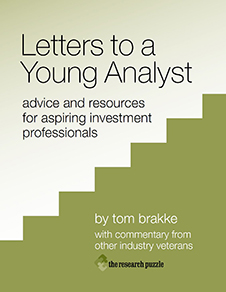
- Tuesday, March 25th, 2014
- the reluctant portfolio manager
-
The last posting reflected on the “business of herding” that is the investment world.the research puzzle | Not that you have to go with the herd, of course, but that it defines the environment. Now it is time to personalize the issues.
It has been longer than normal between dispatches, as I finalized my first ebook,Gumroad | You may purchase the book on this site. Along with it, you receive a subscription to a quarterly newsletter that will be limited to purchasers of the book. prompted by the “letters to a young analyst” that first appeared on this blog. In addition to the original letters, the ebook contains a new letter, an in-depth resources section for aspiring professionals, and advice and commentary from a number of notable contributors.
One of those contributors, Aswath Damodaran, wrote: “Markets are about money and money can twist human beings into pretzels.” I liked the quote so much that I used it elsewhere in the book in addition to Damodaran’s section and am doing it again here.
Imagine yourself in this situation: You are charged with investing other people’s money in a set of assets that you think is overpriced. What do you do?
Unless you work at one of the rather small number of asset managers that has defined itself as being willing to let cash build if the opportunity set is unattractive (and taking the business risk that comes along with it), you put the money to work.Inside Investing | For better or for worse (and I think definitely for the worse), the conventional wisdom these days is that the managers closest to the action should not be free to use cash as a weapon. That’s what you do.
You are, deep down, a reluctant portfolio manager. You know you are playing a game of relativity — and a dangerous one at that. Recent performance has brought the money surging in and your firm is promoting your fund hard and heavy. Yet the real opportunities in your domain are disappearing before your eyes. You might sit back and enjoy the moment (they don’t come that often), but you can’t. You are a reluctant portfolio manager.
You put the money to work. That’s what you do.
You might be managing small cap growth. You might be managing a biotech fund.research puzzle pix | And commenting about the prospects of the sector on Seeking Alpha. You might be running a high yield portfolio.
You put the money to work. That’s what you do.
As did those before you in each of those areas in days gone by. Perhaps you are old enough to remember it. You weren’t sitting in the chair then, but you saw the person who was and you remember this part of the cycle — and the other part that followed. Maybe that’s why you’re reluctant.
There are things you can do, of course. Even though you’re not allowed to let the cash build, you can try to lower risk in other ways. But you know your timing will be wrong — it always seems to be — so you’ll pay for it now in lagging performance as the rest of the herd keeps running hard and you start to follow on behind. How long are you willing to be apart? How much of your potential bonus are you willing to forgo? How much career risk are you willing to take?
Yes, the market can twist us into pretzels and so can the institutional imperative that turns a reluctant portfolio manager into a cog in the industry wheel rather than an evaluator of investment opportunities.
You may be that reluctant portfolio manager. Tomorrow’s another day. One day, who knows when, the inflows will be outflows. Until then you put the money to work. That’s what you do.
